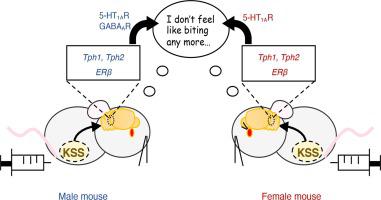Brain Research ( IF 2.7 ) Pub Date : 2021-07-11 , DOI: 10.1016/j.brainres.2021.147580 Kento Igarashi 1 , Toshiko Kuchiiwa 2 , Satoshi Kuchiiwa 3 , Haruki Iwai 4 , Kazuo Tomita 1 , Tomoaki Sato 1

|
Kamishoyosan (KSS), a Japanese traditional herbal formula, is used to treat symptoms related to the autonomic nervous system in men and women; it is especially known for improving the symptoms of irritability (e.g., bad temper and persistent anger). Although clinical and ethological studies of KSS have been conducted, its efficacy in reducing irritability remains to be validated. In the present study, male and female ddY-strain mice were isolation-reared for 8 weeks (from the third postnatal week) to induce pathologically aggressive biting behavior (ABB), which was used as an indicator of irritability. The ABB of mice toward metal rods was measured using the Aggressive Response Meter. An intraperitoneal administration of KSS (100 mg/kg) effectively reduced ABB in male and female mice at 2 h after the administration; however, this effect was canceled by prior administration of WAY-100635 [a 5-hydroxytryptoamine (5-HT)-1A receptor antagonist; 0.5 mg/kg] and bicuculline (a type-A gamma-aminobutyric acid receptor antagonist; 1.0 mg/kg). Additionally, tamoxifen, ICI-182780, and G-15 (all estrogen receptor antagonists) inhibited the action of KSS in a dose-dependent manner. Furthermore, gene expression of tryptophan hydroxylase (Tph) 1 and Tph2 were increased and 5-HT immunofluorescence was slightly increased in the dorsal raphe nucleus (DRN) of isolation-reared mice administered with KSS. Collectively, these results indicate that KSS effectively reduces ABB in isolation-reared male and female mice through stimulation of 5-HT production in the DRN. Our findings also suggest that gene expression of estrogen receptor (Esr) 2 increased in the DRN might be associated with the reduction of ABB.
中文翻译:

Kamishoyosan(日本传统草药配方),有效减少雄性和雌性小鼠的攻击性咬伤行为,并通过增加 Tph1、Tph2 和 Esr2 mRNA 水平进行潜在调节
Kamishoyosan (KSS) 是一种日本传统草药配方,用于治疗男性和女性的自主神经系统相关症状;它以改善易怒症状(例如,坏脾气和持续的愤怒)而闻名。尽管已经对 KSS 进行了临床和行为学研究,但其在减轻易怒方面的功效仍有待验证。在本研究中,雄性和雌性 ddY 株小鼠被隔离饲养 8 周(从出生后第三周开始),以诱导病理性攻击性咬人行为 (ABB),该行为被用作易怒的指标。使用积极响应计测量小鼠对金属棒的 ABB。KSS(100 mg/kg)腹腔给药后2小时有效降低雄性和雌性小鼠的ABB;然而,先前施用 WAY-100635 [一种 5-羟色胺 (5-HT)-1A 受体拮抗剂;0.5 mg/kg] 和荷包牡丹碱(A 型 γ-氨基丁酸受体拮抗剂;1.0 mg/kg)。此外,他莫昔芬、ICI-182780 和 G-15(均为雌激素受体拮抗剂)以剂量依赖性方式抑制 KSS 的作用。此外,基因表达分离饲养的 KSS 小鼠的中缝背核 (DRN) 中色氨酸羟化酶( Tph ) 1和Tph2增加,5-HT 免疫荧光略有增加。总的来说,这些结果表明,KSS 通过刺激 DRN 中 5-HT 的产生,有效地降低了隔离饲养的雄性和雌性小鼠的 ABB。我们的研究结果还表明,DRN 中雌激素受体( Esr ) 2的基因表达增加可能与 ABB 的减少有关。











































 京公网安备 11010802027423号
京公网安备 11010802027423号